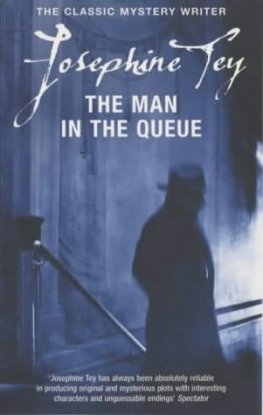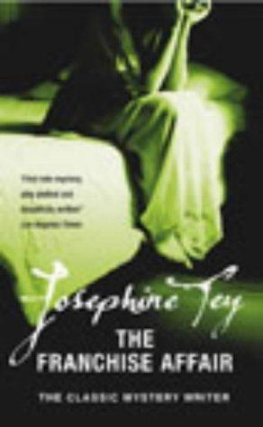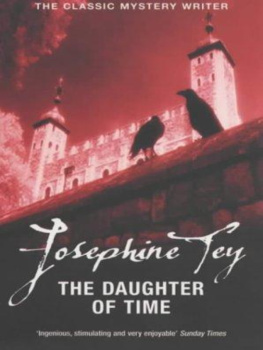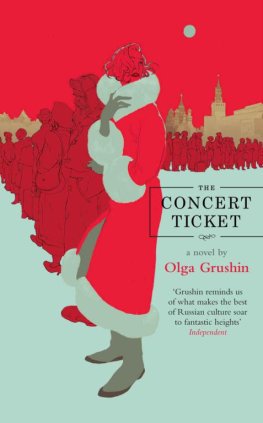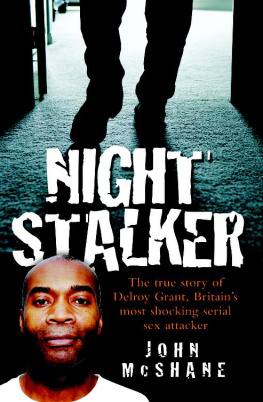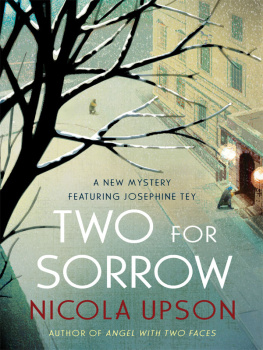Josephine Tey - The Man in the Queue
Here you can read online Josephine Tey - The Man in the Queue full text of the book (entire story) in english for free. Download pdf and epub, get meaning, cover and reviews about this ebook. year: 1929, genre: Detective and thriller. Description of the work, (preface) as well as reviews are available. Best literature library LitArk.com created for fans of good reading and offers a wide selection of genres:
Romance novel
Science fiction
Adventure
Detective
Science
History
Home and family
Prose
Art
Politics
Computer
Non-fiction
Religion
Business
Children
Humor
Choose a favorite category and find really read worthwhile books. Enjoy immersion in the world of imagination, feel the emotions of the characters or learn something new for yourself, make an fascinating discovery.
- Book:The Man in the Queue
- Author:
- Genre:
- Year:1929
- Rating:5 / 5
- Favourites:Add to favourites
- Your mark:
- 100
- 1
- 2
- 3
- 4
- 5
The Man in the Queue: summary, description and annotation
We offer to read an annotation, description, summary or preface (depends on what the author of the book "The Man in the Queue" wrote himself). If you haven't found the necessary information about the book — write in the comments, we will try to find it.
The Man in the Queue — read online for free the complete book (whole text) full work
Below is the text of the book, divided by pages. System saving the place of the last page read, allows you to conveniently read the book "The Man in the Queue" online for free, without having to search again every time where you left off. Put a bookmark, and you can go to the page where you finished reading at any time.
Font size:
Interval:
Bookmark:

The Man in the Queue Author
Josephine Tey
1 Murder
It was between seven and eight o'clock on a March evening, and all over London the bars were being drawn back from pit and gallery doors. Bang, thud, and clank. Grim sounds to preface an evening's amusement. But no last trump could have so galvanized the weary attendants on Thespis and Terpsichore standing in patient column of four before the gates of promise. Here and there, of course, there was no column. At the Irving, five people spread themselves over the two steps and sacrificed in warmth what they gained in comfort; Greek tragedy was not popular. At the Playbox there was no one; the Playbox was exclusive, and ignored the existence of pits. At the Arena, which had a three weeks' ballet season, there were ten persons for the gallery and a long queue for the pit. But at the Woffington both human strings tailed away apparently into infinity. Long ago a lordly official had come down the pit queue and, with a gesture of his outstretched arm that seemed to guillotine hope, had said, "All after here standing room only." Having thus, with a mere contraction of his deltoid muscle, separated the sheep from the goats, he retired in Olympian state to the front of the theatre, where beyond the glass doors there was warmth and shelter. But no one moved away from the long line. Those who were doomed to stand for three hours more seemed indifferent to their martyrdom. They laughed and chattered, and passed each other sustaining bits of chocolate in torn silver paper. Standing room only, was it? Well, who would not stand, and be pleased to, in the last week of Didn't You Know? Nearly two years it had run now, London's own musical comedy, and this was its swan song. The stalls and the circle had been booked up weeks ago, and many foolish virgins, not used to queues, had swelled the waiting throng at the barred doors because bribery and corruption had proved unsuccessful at the box office. Every soul in London, it seemed, was trying to crowd into the Woffington to cheer the show just once again. To see if Golly Gollan had put a new gag into his triumph of foolery Gollan who had been rescued from a life on the road by a daring manager, and had been given his chance and had taken it. To sun themselves yet once more in the loveliness and sparkle of Ray Marcable, that comet that two years ago had blazed out of the void into the zenith and had dimmed the known and constant stars. Ray danced like a blown leaf, and her link aloof smile had killed the fashion for dentifrice advertisements in six months. "Her indefinable charm," the critics called it, but her followers called it many extravagant things, and defined it to each other with hand-wavings and facial contortions when words proved inadequate to convey the whole of her faery quality. Now she was going to America, like all the good things, and after the last two years London without Ray Marcable would be an unthinkable desert. Who would not stand forever just to see her once more?
It had been drizzling since five o'clock, and every now and then a light chill air lifted the drizzle and half playfully swept the queue from end to end with it in one long brushstroke. That discouraged no one even the weather could not take itself seriously tonight; it had merely sufficient tang to provide a suitable apritif to the fare in front of them. The queue twiddled its toes, and Cockneywise made the most of whatever entertainment provided itself in the dark canyon of the lane. First there had come the newsboys, small things with thin, impassive faces and wary eyes. They had flickered down the queue like wildfire and disappeared, leaving behind a trail of chatter and fluttering papers. Then a man with legs shorter than his body laid a ragged strip of carpet on the damp pavement and proceeded to tie himself into knots until he looked as a spider does when it is taken unawares, his mournful toad's eyes gleaming now and then from totally unexpected places, in the writhing mass, so that even the most indifferent spectator felt his spine trickle. He was succeeded by a man who played popular airs on the fiddle, happily oblivious of the fact that his E string was half a tone flat. Then, simultaneously, came a singer of sentimental ballads and a syncopated orchestra of three. After they had scowled at each other for a moment or two, the soloist tried to rush things on the possession-being-nine-points principle, by breaking into a wailing Because You Came to Me, but the leader of the orchestra, handing his guitar to a lieutenant, proceeded to interview the tenor, with his elbows out and his hands lifted. The tenor tried to ignore him by looking over his head, but found it difficult, because the musician was half a head taller than himself and appeared to be ubiquitous. He persevered for another two lines, and then the ballad wavered uncertainly into bitter expostulation in his natural voice, and two minutes later he faded up the dark alley, mumbling threats and complaints, and the orchestra broke into the latest dance tune. This being more to the taste of the moderns than inappropriate resurrection of decayed sentiment, they promptly forgot all about the poor victim of force majeure, and twiddled their toes in time to the lively measure. After the orchestra, and severally, came a conjurer, an evangelist, and a man who allowed himself to be tied up in a rope with imposing-looking knots, and as imposingly worked himself free.
All these did their little turn and moved on to another performance elsewhere, and each one before leaving made a tour of the line, thrusting limp but importunate headgear into the meagre interstices of the queue, and saying, "Thank you! Thank you!" as encouragement to the bountiful. By way of punctuation to the programme, there had been vendors of sweetmeats, vendors of matches, vendors of toys, vendors even of picture post cards. And the crowd had parted good-naturedly with their pence and found amusement sufficient to their needs.
Now a shudder ran down the line a shudder that the experienced recognized as but one thing. Stools were given up or folded into handbags, food disappeared, purses appeared. The doors were open. The lovely exciting gamble had begun. Was it to be win, place, or lose by the time they came to the wicket? Up in the front of the queue where the order was less mathematically two-and-two than down in the open, the excitement of the door-opening had for a moment or two overcome the habitual place-keeping instincts of the Englishman I say Englishman advisedly; the Scot has none of it and there had been a mild pushing and readjustment before the queue had become immobile in a wedged and short-breathing mass before the guichet, which was immediately inside the pit door. The clink and rattle of coin on brass proclaimed the continual hurried transactions which made the lucky ones free of paradise. The very sound of it made those behind strain forward unconsciously until the crowd in front protested as audibly as their crushed lungs permitted, and a policeman went down the queue to remonstrate. "Now then, now then, stand back a bit. There's plenty of time. You won't get in by pushing. All in good time." Now and then the whole line tottered forward a few inches as the emancipated ones ran in twos and threes from the head of it, like beads rolling from a broken string. Now a fat woman held them up by fumbling in her bag for more money. Surely the fool could have found out before now the exact amount required instead of keeping them back like this. As if conscious of their hostility she turned to the man behind her and said angrily:
"'Ere, I'll thank you to stop shoving. Can't a lady be allowed to take out her purse without every one losing their manners?"
Next pageFont size:
Interval:
Bookmark:
Similar books «The Man in the Queue»
Look at similar books to The Man in the Queue. We have selected literature similar in name and meaning in the hope of providing readers with more options to find new, interesting, not yet read works.
Discussion, reviews of the book The Man in the Queue and just readers' own opinions. Leave your comments, write what you think about the work, its meaning or the main characters. Specify what exactly you liked and what you didn't like, and why you think so.

